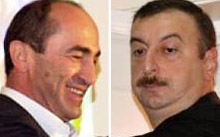The Karabagh conflict negotiations process is heating up. On June 22, the OSCE Minsk Group co-chairmen announced at the OSCE constant council that they can no longer put up with Kocharyan and Aliev and demand a final resolution to the Karabagh conflict this year. The co-chairmen also warned the presidents that if they couldn’t resolve the conflict, then they could lose hope that the Minsk group will organize more meetings because it has done all it could. Besides that, the co-chairmen mention the fact that this final draft is the most beneficial for both sides. If a war starts, then the presidents of Armenia and Azerbaijan will be held responsible.
The co-chairmen have revealed the principles of the Karabagh conrflict resolution and call on the presidents to discuss them with the public. The OSCE Minsk Group co-chairmen have emphasized the fact that 2006 is still “the outlook for a major opportunity to make an agreement on the Karabagh conflict” and they consider losing that opportunity as a tragic loss.
Recalling their visit to the region about a month ago, the co-chairmen add:
“Reaching an agreement on the main principles before the Great Eight summit in St. Petersburg in July will help get a lot of help from the international community and financial contributions for restoration and peackeeping.”
The co-chairmen keep saying that the only way to resolve the conflict is by establishing peace and that the presidents of both countries have to prepare the people for peace and not war. They also say that they have come up with the principles based on the events of the past nine years.
“We are going along with the principles that will lead us to progress, but let’s leave some extremely difficult issues for later and let’s focus on the upcoming negotiations. The principles include the dislocation of Armenian forces from the Azerbaijani territories and focusing on the regions of Kelbajar and Lachin. After that, military forces will be taken out of these regions. The people of Karabagh will participate in a referendum in order to define the final status of Karabagh, but the date remains unscheduled. The Armenian and Azerbaijani sides will have to continue negotiations on deciding the referendum date and how it should be. There may be some agreements to have Karabagh communicate with the international contributors and peackeeping forces will be allocated. A committee focusing on reaching the agreement will be formed and the financial contributions from abroad will help take out bombs, restoration and get the people who had evacuated and suffered from the Karabagh war return to their residencies. Both sides refrain from applying force or making threats and guarantee international and regional security. We would like to mention the fact that only the negotiators can come to an agreement on the referendum to define the status of Karabagh. Ther e have to be prerequisites stating where the referndum must take place, somewhere where there are no demands and the citizens will have the opportunity to make their choice after public discussions,” as stated in the announcement of the co-chairmen.
They also state the announcements of the negotiators, who claim that they have never been this close to an agreement. However, despite that, the sides haven’t been able to reach an agreement. The co-chairmen say that they can’t come up with any other way of “recognizing and making a final draft of the principles”. They say that there is no alternative to their mentioned principles for resolving the Karabagh conflict. So, they call on the presidents to work “with their people and form an agreement on the principles which will benefit the two. “ Otherwise, as the co-chairmen say, if a war starts, then the presidents of both countries will be responsible for the interaction between the people and the international community.
“We don’t think there’s any meaning to continue being intermediaries, something which we have done during the past couple of months. We also don’t think there is a meaning to organize more meetings until both presidents don’t express their wish to solve the issues that they had disagreed on. Of course, the OSCE Minsk Group co-chairmen will continue helping each side as intermediaries. We will be ready to help the sides if they truly decide to continue the negotiations with the political will that they lacked until now,” say the co-chairmen in closing.
P.S. In fact, the U.S. Ambassador to Armenia has put this announcement on his official website.

